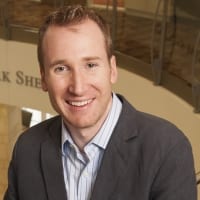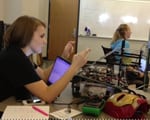“The bitcoin ecosystem is in need of regulatory oversight and reform.” — bitcoin expert Tyler Moore, SMU assistant professor
Journalist Will Deener with The Dallas Morning News tapped the expertise of SMU Bitcoin and cybersecurity expert Tyler W. Moore, an assistant professor of computer science in the Lyle School of Engineering.
Moore’s expertise draws in part on his research that found that online money exchanges that trade hard currency for the rapidly emerging cyber money known as Bitcoin have a 45 percent chance of failing — often taking their customers’ money with them.
The finding is from a computer science study in which Moore applied survival analysis to examine the factors that prompt Bitcoin currency exchanges to close.
Moore is an expert in security economics, cyber security, cyber crime and critical infrastructure protection. His most recent research studies are The Ghosts of Banking Past: Empirical Analysis of Closed Bank Websites and Empirical Analysis of Denial-of-Service Attacks in the Bitcoin Ecosystem.
The papers were presented earlier in March at the co-located conferences, 18th International Annual Financial Cryptography and Data Security Conference and the 1st Workshop on Bitcoin Research.
Bitcoin writer Garrick Hileman also covers Moore’s research at the conference in “Pirate Treasure Resurfaces at Bitcoin’s First Academic Workshop” on the digital currency news blog CoinDesk.
EXCERPT:
By Will Deener
Dallas Morning News
Bitcoin was a dream come true for computer geeks, libertarians and big government paranoids.Just imagine a digital currency untethered from government regulators, existing only in the virtual world of computer code and cheaper to use than credit cards.
But the recent collapse of a leading bitcoin exchange, Mt. Gox, has raised concerns about the legitimacy of this virtual currency.
A $470 million digital heist last month at the Tokyo-based exchange pushed the company into bankruptcy and left many bitcoin investors empty-handed with little recourse.
Mt. Gox chief executive Mark Karpeles offered some hollow condolences during a late February press conference in Tokyo. He basically said, oops, there was a bug in the bitcoin software, which allowed thieves to hack their way into the system and fraudulently withdraw bit coin.
And to think this was supposedly the precursor to a digital Utopia.
Investors in traditional currencies — U.S. dollar, Japanese yen or Swiss franc — need a cast iron stomach, a savvy trading strategy and a fat wallet because big losses are inevitable.
Breaking news in these markets is like waving a biscuit at a mad dog. It comes fast, and it ain’t pretty.
But at least sovereign governments and regulatory authorities stand behind and monitor traditional currencies. While Bitcoin’s exchange rate is even more volatile than traditional currencies, there is no oversight from the FDIC, Federal Reserve or U.S. Treasury.
Tyler Moore, an SMU assistant professor in computer science and engineering, said he doesn’t believe the Mt. Gox fiasco will spell the demise of bitcoin, but regulatory safeguards are needed. Moore co-authored a research report last year in which he examined the risks of investing in bit coin.
“The bitcoin ecosystem is in need of regulatory oversight and reform,” he wrote in an email response to my questions. “Bitcoin currency exchanges act like de facto banks. Many customers leave the bitcoins in accounts at the exchanges, but there are no capital requirements as there are for traditional banks.”
Follow SMUResearch.com on Twitter.
For more information, www.smuresearch.com.
SMU is a nationally ranked private university in Dallas founded 100 years ago. Today, SMU enrolls nearly 11,000 students who benefit from the academic opportunities and international reach of seven degree-granting schools. For more information see www.smu.edu.
SMU has an uplink facility located on campus for live TV, radio, or online interviews. To speak with an SMU expert or book an SMU guest in the studio, call SMU News & Communications at 214-768-7650.

 Women have made strides for equality in society, but gender gap still exists in art museum directorships
Women have made strides for equality in society, but gender gap still exists in art museum directorships Search for dark matter covers new ground with CDMS experiment in Minnesota
Search for dark matter covers new ground with CDMS experiment in Minnesota NOvA experiment glimpses neutrinos, one of nature’s most abundant, and elusive particles
NOvA experiment glimpses neutrinos, one of nature’s most abundant, and elusive particles SMU scientists to deploy seismic monitors in North Texas region near Azle, Texas
SMU scientists to deploy seismic monitors in North Texas region near Azle, Texas Parents less likely to spank after reading briefly about its links to problems in children
Parents less likely to spank after reading briefly about its links to problems in children Wall Street’s short sellers wrongly maligned — detected red flags ahead of US financial crisis
Wall Street’s short sellers wrongly maligned — detected red flags ahead of US financial crisis




 To book a live or taped interview with Dr. Tyler Moore in the SMU
To book a live or taped interview with Dr. Tyler Moore in the SMU  The Undying Radio: Familiarity breeds content when it comes to listeners and music
The Undying Radio: Familiarity breeds content when it comes to listeners and music Mosquito indexing system identifies best time to act against potential West Nile Virus outbreaks
Mosquito indexing system identifies best time to act against potential West Nile Virus outbreaks Sweden, SMU psychologists partner to launch parenting program that reduces child abuse
Sweden, SMU psychologists partner to launch parenting program that reduces child abuse Chemical probe confirms that body makes its own rotten egg gas, H2S, to benefit health
Chemical probe confirms that body makes its own rotten egg gas, H2S, to benefit health Study: High-volume Bitcoin exchanges less likely to fail, but more likely to suffer breach
Study: High-volume Bitcoin exchanges less likely to fail, but more likely to suffer breach Musicians who learn a new melody demonstrate enhanced skill after a night’s sleep
Musicians who learn a new melody demonstrate enhanced skill after a night’s sleep
 Study finds that newlyweds who are satisfied with marriage are more likely to gain weight
Study finds that newlyweds who are satisfied with marriage are more likely to gain weight Fruit flies fed organic diets are healthier than flies fed nonorganic diets, study finds
Fruit flies fed organic diets are healthier than flies fed nonorganic diets, study finds Center for Creative Leadership to study innovative learning method of SMU Lyle School of Engineering
Center for Creative Leadership to study innovative learning method of SMU Lyle School of Engineering NOvA neutrino detector in Minnesota records first 3-D particle tracks in search to understand universe
NOvA neutrino detector in Minnesota records first 3-D particle tracks in search to understand universe





